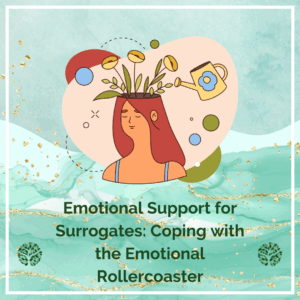
Becoming a surrogate is a deeply rewarding experience, but it can also come with emotional ups and downs. From the physical demands of pregnancy to the emotional complexities of carrying a baby for someone else, it’s essential for surrogates to prioritize their own emotional well-being. Here are strategies and resources to help surrogates navigate the emotional rollercoaster independently.
1. Practice Self-Care Daily
Prioritize your physical and mental health by incorporating small acts of self-care into your routine. Simple practices like taking a relaxing bath, going for a walk, meditating, or journaling can help you stay centered and manage stress.
2. Set Healthy Boundaries
Surrogacy is a collaborative journey, but it’s important to maintain personal boundaries. Communicate openly with intended parents, your agency, or your medical team if you feel overwhelmed. Protecting your time and energy allows you to focus on your own needs.
3. Learn Stress-Relief Techniques
Breathing exercises, mindfulness, and yoga can help manage feelings of stress or anxiety. Apps like Calm or Headspace offer guided exercises that you can use anytime you feel the need for a mental reset.
4. Educate Yourself About the Process
Understanding the surrogacy journey can help reduce uncertainty and anxiety. Read books, attend workshops, or listen to podcasts about surrogacy to feel more prepared and confident at each stage.
5. Build a Solo Support Plan
While building bonds with others involved in surrogacy is important, creating an independent support system is equally valuable. Consider seeing a therapist who specializes in surrogacy or pregnancy-related emotions. Joining online forums or reading blogs from other surrogates can also provide a sense of solidarity without requiring direct interaction.
6. Focus on Hobbies and Passions
Keep yourself engaged by dedicating time to hobbies or activities you love. Whether it’s painting, gardening, reading, or learning something new, staying busy with personal interests can offer a healthy emotional outlet.
7. Monitor Your Emotional Health
Pregnancy can bring hormonal changes that affect mood. Keep a journal to track your feelings and identify patterns. If you notice prolonged periods of sadness or anxiety, don’t hesitate to reach out to a healthcare professional for guidance.
8. Utilize Resources Designed for Surrogates
Your agency can connect you with counselors or support services tailored for surrogates. Take advantage of these resources, as they are designed to address your unique needs and challenges.
Your Emotional Well-Being Matters
Coping with the emotional rollercoaster of surrogacy is an ongoing process, but with proactive self-care and the right strategies, you can navigate it with strength and confidence. By focusing on your independent well-being, you’ll be better equipped to embark on the rewarding journey of creating a family.
